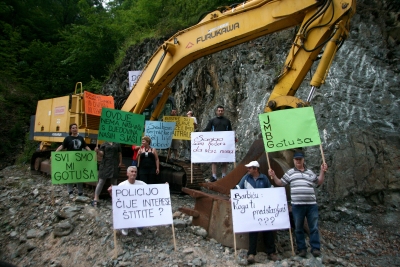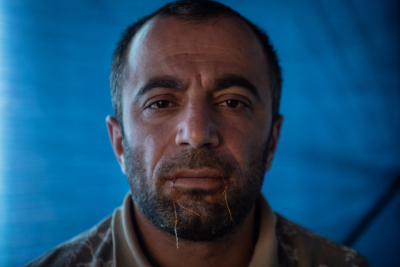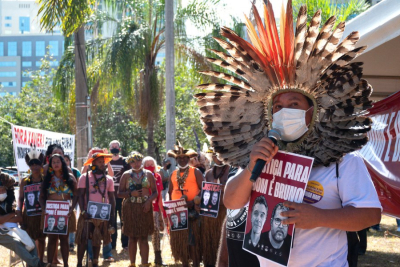Fojnica is a town and municipality in central Bosnia and Herzegovina, Sarajevo. The Željeznica, the fast mountain river with crystal clear water, flows through the region from south to north. In 2009, the villagers living alongside the river discovered that there were plans to build two hydropower plants there, which would cause significant changes to the flow of the river and the water quality-- something the locals refused to watch happen.
"Our fight against hydropower plants on the River Željeznica has lasted for almost ten years."
Robert Oroz, Gotuša ecological-humanitarian organization
This story is one of the few cases in which environmental activists have interfered with the construction of small hydropower plants.
Driven by concern for the nearby environment and for the river itself, which is often the source of drinkable water, the locals had no other choice, but to literally block the construction machinery. In 2009, they spent three months at the site, with the trucks and the excavators entering the riverbed. They used private cars to create traffic jams and benches to block the roads, and even stood up against the machines themselves. The second and greatest battle took place from 2012 to 2013, when the people of Fojnica kept watch over the site for 325 days and nights.
Court: both hydropower plants are illegal
As a result, the company filed a lawsuit claiming trespass, demanding that activists pay the cost of proceedings. Both the first instance and the appeal were held in 2016. The citizens' activity consisted of trespassing and, as a result of the activists' cover of the proceedings, amounted to BAM 6,500 (roughly € 3250).
In the course of action, the activists claimed that the company had no authority to build the hydropower plants. During a related court case, the construction permits were canceled, making the intended projects illegal.
The construction of Luke 1 and Luke 2 hydropower plants never started.
This unique case shows that there are activists in the Balkans who are willing to go to great lengths and endanger their well-being in order to protect the environment. Nevertheless, their actions do not result in protection by institutions, who tend to secure other parties' interests. On the other hand, the direct action was successful-- the investor gave his plan and the river remains free from the controversial dams for now.
The politicians are selling the country overnight
The "Fojnica case" is just one chapter of a long story about Balkan wild rivers vanishing. Since 2002, hundreds of concessions for the construction of hydropower plants have been granted in Bosnia and Herzegovina. A country with countless natural wild rivers is experiencing a hydropower plant boom, with all the consequences that implies. “In 2006, the government issued 112 concessions overnight. Now, our politicians are using this precedent as an example,” Jelena Ivanic from Center for Environment explains. They are using this as an example because of the irreversible damage to the environment, including water quality, and changes in the flow and the profile of the riverbed. Nevertheless, the story of Balkan is still not finished.
Further reading:
ENG 08/12/2014 Hydroelectric Power Plants Boom (Arnika)
ENG 20/02/2015 Balkan dam boom threats Europe's last wild waterways (The Guardian)
BOS 29/12/2016 River keepers (H-Alter)
ENG 22/02/2017 Small is not (always) beautiful: small hydro development in the Western Balkans (Balkan Green Energy News)
BOS 17/08/2017 Civic Courage: H-Alter
BOS 17/08/2017 Mještani brane gradnju hidrocentrala in Rijeka Kruščica (Televizia Zenica)
Videos:
25/7/2017 Freedom to the Rivers (1 min) (Rijeke BiH - YouTube)
29/12/2016 River keepers (8 min) (Rijeke BiH - YouTube)
28/12/2015 Sutjeska NP: The Dead Capital (7 min) (Centar za životnu sredinu - YouTube)
20/2/2017 Sana being destroyed (Centar za životnu sredinu - YouTube)





